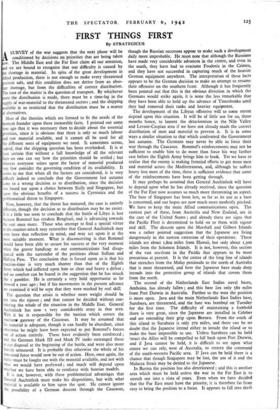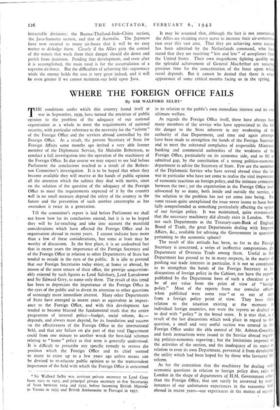FIRST THINGS FIRST
By STRATEGICUS SURVEY of the war suggests that the next phase will be conditioned by decisions on 'priorities that are being taken ow. The Middle East and the Far East claim all our attention, d we are bound to recognise that our difficulty is caused by he shortage in material. In spite of the great development in Hied production, there is not enough to make every threatened osition safe, and this condition does not derive from an abso- ute shortage, but from the difficulties of correct distribution. he root of the matter is the question of transport. By whichever oute the distribution is made, there must be a time-lag in the upply of war-material to the threatened sectors ; and the shipping vailable is so restricted that the distribution must be a matter alternatives.
Most of the theories which are formed to fit the needs of the oment founder upon these inexorable facts. I pointed out some ume ago that it was necessary then to decide about the essential iorities, since it is obvious that there is only so much labour and raw material available, and it cannot all be used for all he different sorts of equipment we need. It sometimes seems, indeed, that the shipping question has been overlooked. It is at east certain that without a full knowledge of all the relevant facts no one can say how the priorities should be settled ; but whereas everyone seizes upon the factor of material produced very few consider the governing condition of its availability. It seems to me that when all the factors are considered, it is very difficult indeed to conclude that the Government last autumn came to a wrong decision as to distribution, since the decision was based not upon a choice between Sicily and Singapore, but upon the obvious benefits of a success in Cyrenaica and the problematical threat to Singapore.
Now, however, that the threat has matured, the case is entirely different, though the decision as to distribution may be no easier. It is a little too soon to conclude that the battle of Libya is lost because Rommel has retaken Benghazi, and is advancing towards the east once more. Those who attempt to find a special virtue in the counter-attack may remember that General Auchinleck may even have that reflection in mind, and may act upon it at the most suitable moment. What is disconcerting is that Rommel should have been able to secure his success at the very moment when the graver handicap to our communications had disap- peared with the surrender of the positions about Sollum and Halfaya Pass. The conclusion that is forced upon us is that his reaction-time is very much shorter than that of the Eighth Army which had inflicted upon him so clear and heavy a defeat ; and no comfort can be found in the suggestion that he has struck like a gambler. He is certainly a very bold opportunist as he showed a year ago ; but if his movements in the present advance are examined it will be seen that they were marked by real skill. The question that arises is whether more weight should be put into the riposte ; and that cannot be decided without con- sidering the whole of the situation in the Middle East. General Auchinleck has now t very considerable army in that area. With it he is responsible for the bastion which covers the southern gateway of the Caucasus. It may be assumed that his material is adequate, though it can hardly be abundant, since Otherwise he might have been expected to put Rommel's forces out of action entirely. These have evidently been reinforced ; and the German Mark III and Mark IV tanks outranged those it our disposal at the beginning of the battle, and were also more heavily armoured. It is probable that otherwise the whole of his armoured force would now be out of action. Here, once again, the rattle must be fought out with the material available, and not with what we would have preferred ; and much will depend upon whether we have been able to reinforce with heavier models.
It is not, however, with• these problematical advantages that General Auchinleck must make his dispositions, but with what material is available to him upon the spot. He cannot ignore the possibility of a German descent through the Caucasus,
though the Russian successes appear to make such a development daily more improbable. He must note that although the Russians have made very considerable advances in the centre, and even in the south, they have had to evacuate Feodosia in the Crimea, and they have not succeeded in capturing much of the heavier German equipment anywhere. The interpretation of these facts appears to be the German decision to make an attempt to resume their offensive on the southern front. Although it has frequently been pointed out that this is the obvious direction in which the Germans would strike again, it is none the less remarkable that they have been able to hold up the advance of Timoshenko until they had removed their tanks and heavier equipment.
The development of the Libyan offensive will to some extent depend upon this situation. It will be of little use for us, three months hence, to lament the deterioration in the Nile Valley and Levant-Caspian area if we have not already made the correct distribution of men and material to prevent it. It is in some ways a similar situation to that which confronted the Government last autumn. The Germans may never be able to force their way through the Caucasus. Rommel's reinforcements may not be sufficient to enable him to do more than force his way farther east before the Eighth Army brings him to book. Yet we have to realise that the enemy is making frenzied efforts to get more men and material across the Mediterranean, and, although he suffers heavy loss most of the time, there is sufficient evidence that some of the reinforcements have been getting through.
It may perhaps be assumed that General Auchinleck will have to depend upon what he has already received, since the question of the Far East now assumes so much more threatening an aspect. The base of Singapore has been lost, so far as its use as a base is concerned, and our hopes are now much more modesIly pitched. We have to keep the main Allied communications open. The eastern part of these, from Australia and New Zealand, are in the care of the United States ; and already there are signs that the Pacific Fleet is determined to hold on to them with vigour and skill. The descent upon the Marshall and Gilbert Islands was a rather pointed suggestion that the Japanese are living dangerously in the eastern extension of their operations. These islands are about r,800 miles from Hawaii, but only about 1,3oo miles from the Solomon Islands. It is not, however, this section of the vast sea-front in the Pacific that appears to be most precarious at present. It is the centre of the long line of islands that stretches from the Malay peninsula to the north of Australia that is most threatened, and here the Japanese have made deep inroads into the protective group of islands that covers them from the north.
The second of the Netherlands East Indies naval bases, Amboina, has already fallen ; and this base lies only 58o miles from Port Darwin in Australia. Farther to the west the position is more open. Java and the main Netherlands East Indies base, Surabaya, are threatened, and the base was bombed on Tuesday for the first time. The difficulty of maintaining a foothold there is very great, since the Japanese are installed in Celebes and are extending their grip upon Borneo. From the south of this island to Surabaya is only 270 miles, and there can be no doubt that the Japanese intend either to invade the island or to make the base impossible to use. Unless Surabaya can be held intact the Allies will be compelled to fall back upon Port Darwin, and if Java cannot be held, it is difficult to see upon what centre we can rely, west of Australia, to restore the command of the south-western Pacific area. If Java can be held there is a chance that though Singapore may be lost, the use of it and the Malacca Strait may be denied to the Japanese.
In Burma the position has also deteriorated ; and this is another area which must be held unless the war in the Far East is to stretch out into a vista of years. Even when we have decided that the Far East must have the priority, it is therefore far from easy to bring the position to a focus. It appears to fall into three intractable divisions: the Burma:Thailand-Indo-China section, the Java-Sumatra section, and that of Australia. The Japanese have now secured so many air-bases that it will be no easy matter to dislodge them. Clearly if the Allies gain the control of the waters that wash them their danger should die down and perish from inanition. Pending that development, and even after it is accomplished, the main need is for the accumulation of a supreme air-force. But the difficulties of achieving this supremacy while the enemy holds the seas is very great indeed, and it will be even greater if we cannot maintain our hold upon Java. It may be assumed that, although the fact is not announced, the Allies are straining every nerve to increase their air-concentra. tion over this vast area. That they are achieving some success has been admitted by the Netherlands command, who have stated that they are receiving " lots and lots " of aeroplanes from the United States , Their own magnificent fighting quality and the splendid achievement of General MacArthur are securing precious time for the concentration of the force upon which recoil depends. But it cannot be denied that there is even appearance of some critical months facing us in the spring.



























 Previous page
Previous page